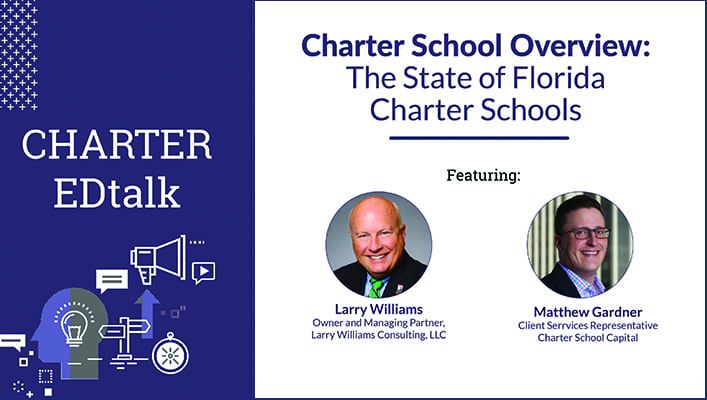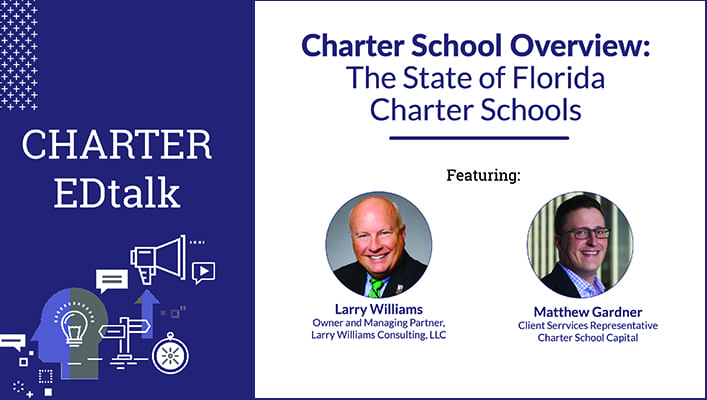CHARTER EDtalk: The State of Florida Charter Schools
We wanted to check in on the state of Florida charter schools, so in this CHARTER EDtalk, Matthew Gardner, Charter School Capital Client Service Representative, had the privilege of sitting down with Larry Williams, Owner and Managing Partner at Larry Williams Consulting, LLC. Larry shares his expert insights on the state of Florida Charter Schools including their history and growth trajectories, performance rankings, obstacles they’re facing, and what the future looks like for charter schools in Florida.
To learn more about the state of Florida’s charter schools, please watch the video below or read the complete transcript below.
Matthew Gardner: Hello there, and thank you for joining us for this episode of Charter Ed Talks. I’m Matthew Gardner at Charter School Capital, and today we’re honored to be joined by Larry Williams to discuss the state of charter schools in sunny Florida.
So thank you for joining us, and we’re going to go ahead and just jump right in and kick things off.
So, Larry, taking the temperature of Florida, when did charter schools first appear on Florida’s educational landscape?
Larry Williams: The first charter school law for Florida was passed in 1996, which was also the same year that the first charter school opened, which was in Liberty City in the Miami area.
Actually, a group of parents there, in partnership with the future Florida governor Jeb Bush, opened that charter school in Florida. So that became the first charter school.
After that, then charter schools continued to grow. Somewhat at a slow pace there, but that was the very first one, the same year as the first charter school law was passed.
Gardner: Excellent, excellent. Thank you. What’s been the path of charter school growth since first being introduced in the state?
Williams: The charter school growth in Florida over the course of time, from 1996 to present, has been very good. From 1996 to probably 2012, 2014, that time frame there, almost a rocket pace. I mean, very steep growth rate.
Since then, over the last several years, we continue to see charter schools open. However, the rate of growth has slowed down somewhat, so we’re not seeing as many charter schools open every year. Net positive, though. We’re still seeing more charter schools open than we are seeing closed.
Gardner: Okay.
Williams: So, overall, our growth rate has gone down, but we still have significant numbers. We’re probably the third largest state. Well, we’re the third largest state, population. We have the third largest total of charter schools – over 660 charter schools servicing about 295,000 students in the state of Florida.
Gardner: Right. Wow. Excellent. How would you say the Florida charter school performance ranks with charter schools in other states?
Williams: They’re probably right around … probably very similar to their ranking with the National Charter School Alliance data on the model laws, right around number seven. So they’re in the top ten. So their performance is within top ten of other charter schools in the country.
Washington, D.C. pretty much leads the nation, but certainly with more charter schools, then we have a lot more accountability issues that we have to deal with.
Gardner: Right.
Williams: We can talk about some particular problems there. But, overall, about number six or number seven, compared to other schools in the country.
Gardner: That’s great. What do you feel is the biggest obstacle for new charter schools opening in the state?
Williams: Very interesting. If you listened to Nina Rees’s comments [at the National Charter Schools Conference] about how first people ignore you, then they’ll make fun of you, then they’ll try to brush you away, then they start fighting you, and then you try to win, we are now at a stage where we’re, in the charter school environment, having to take on the traditional public schools, the teachers’ unions, and others.
Gardner: Right.
Williams: Very, very serious. They put significant money, put significant resources behind advocating for traditional schools, as opposed to charters – not just allowing charters to be part of their portfolios, but, actually, it’s an us against them, more so than we’ve ever seen.
So that’s a very big obstacle. Another obstacle is the folks that they’re advocating to – traditionally those that are on the left side of the aisle, where you would think that those folks would be more supportive of charter schools, particularly into the student population that these folks generally represent.
But it’s not. It’s definitely a Republican vs. Democrat issue, with Republicans being solidly behind it, Democrats not, because they’re supported a lot by teachers’ unions and school districts and school board members and so forth.
Gardner: Right.
Williams: So that’s probably the biggest obstacle that I see right now, is an elevated effort by traditional public schools and traditional districts to really limit charter schools – new charter schools and present charter schools.
Gardner: Okay. That was definitely leading into my next question. So does that also affect schools that are currently in operation and open right now?
Williams: Yes, and the Florida legislature has worked very hard to walk right I call kind of a tightrope, but being in favor of strong accountability measures, but not wanting to kill the gnat with a sledgehammer type of attitude.
We have one of the statues in Florida … or the charter statute in Florida says when you get a second F, two Fs on a charter school, you have to close the charter school.
Gardner: Right.
Williams: We have a number of traditional schools in Florida who have received F, F, F, F, F, F. They may have a turnaround plan, but they just continue to operate. The legislature’s tried to kind of move that, kind of limit their choices in doing that, having certain turnaround plans, and one of those is opening up to a charter school.
We did that in Jefferson County. The State Board of Education saw just persistently failing schools there and finally toward the school board of Jefferson County … It’s like, “You have no choice. You have to turn this into a charter district. That’s the only thing we can approve.”
Since then, they’ve gone from an F to a C in their first year of operation, on less dollars than what the school district was operating on before.
Gardner: Right.
Williams: So we’ve seen where, with the right environment, that those kids are certainly capable of learning. Also, kids that were leaving Jefferson County, going to Leon County and other counties to get to better schools, where their parents were sending them, are now coming back to Jefferson. So they’re seeing their student populations increase. So we’ve proven that we can do that.
Gardner: True.
Williams: So the legislature’s worked very hard to make it as level a playing field as possible and then hold districts more accountable for those persistently low failing schools that they have.
Gardner: That’s excellent. All right. So, lastly, what do you see for the future of charter schools in Florida?
Williams: I see tremendous opportunity in terms of its growth, personally. The folks that I work with on a regular basis, the members of the legislature, and the Florida Department of Education …
We have a unique situation in Florida, where our former Speaker of the House, Richard Corcoran, who was a very, very, very big proponent of charter schools and, under his watch, passed some very significant legislation in regard to Schools of Hope, Hope Scholarships.
Gardner: Right.
Williams: Very, very, very pro-choice. After his Speaker term ended along with his legislative term, we got a new governor, Ron DeSantis, who then appointed him, essentially, as our new education commissioner.
So now we have, within the Department of Education, a very strong choice department, particularly for charter schools, and we’ve seen a lot go on recently that has certainly indicated that that’s the direction that the Department of Education’s going to go in.
The legislature continues to be very strong on choice and very strong on charter schools. We’ve strengthened the Schools of Hope legislation we passed two years ago. We’ve done some other changes to the statute that make it even more enhanced, better incentives for Schools of Hope.
We’re seeing the results of that right now. KIPP Schools is coming into Hillsborough County. They’re starting this year. IDEA schools are starting in Miami Bay. Those are already on the books. Now just had announced about in the last week or so that KIPP’s now going to open several in Duval County.
Gardner: Oh, wow.
Williams: I mean, so they’re seeing that opportunity there. So this is going to be a major influx of schools, from a world-renowned group like IDEA Schools.
Gardner: That’s good.
Williams: So I think you’re going to continue to see the legislature work both on fine-tuning the accountability measures – certainly holding those schools that are not doing as well as they should accountable, but recognizing those schools that are outperforming their traditional partners and recognizing them.
So I think the attitude and the environment is very strongly for charter schools.
Gardner: Excellent. All right. Thank you for your time.
Williams: You’re welcome.

